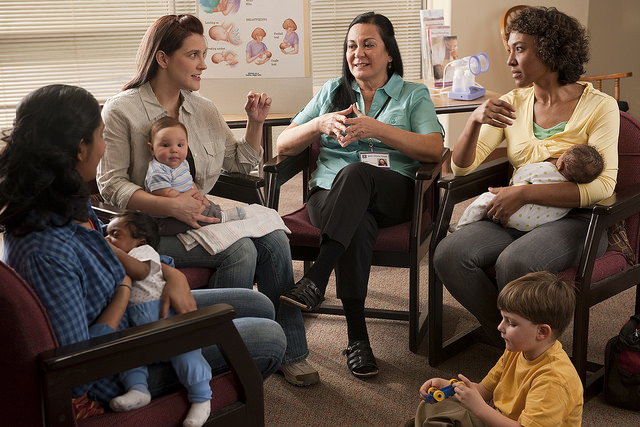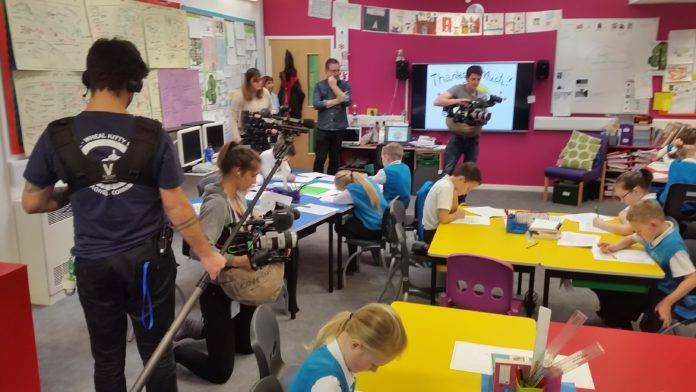
Breastfeeding Experiences – A Q&A with Dr Sally Dowling
Our Breastfeeding and Health Care Professionals Parenting Science Gang is starting to design a research study looking into the experiences of breastfeeding mothers with heath care professionals. We chatted to Dr Sally Dowling of UWE to find out more about the subject.
Image: U.S. Department of Agriculture (CC by 2.0)
Sally: Hello everyone. I’m Sally Dowling, I’m at  Senior Lecturer at UWE, Bristol and I’m interested in breastfeeding experiences and the influences on them.
Senior Lecturer at UWE, Bristol and I’m interested in breastfeeding experiences and the influences on them.
PSG A: What made you get interested in that? And how do you study people’s breastfeeding experiences?
Sally: My interest came out of my own experiences of breastfeeding my younger two daughters. I breastfed them for 3.5 and just over 5 years and got interested in long-term breastfeeding and what it was like for other women.
I’m a qualitative researcher so I’m interested in experiences and feelings – what it’s LIKE for women. I did my PhD about the experiences of women who breastfeed long-term – I spent a lot of time observing in breastfeeding support groups and interviewed women by email and face-to-face.
PSG B: Experiences can be very personal; how do you go about quantifying? Or is that not what you do?
Sally: It’s not about quantifying, with qualitative research, it’s about exploring what it’s like for people – how they experience it.
PSG C: What have you found to be the biggest influence in those who fed beyond 6 months?
Sally: Influence…I’m not sure. Most women I spoke to said that they didn’t intend to breastfeed long-term – it just happened. Most, if they had seen older children breastfed before they did it themselves, didn’t think it was something they would do.
PSG E: That’s me exactly!
Sally: And me! I met one woman who decided when she was pregnant that she would breastfeed until her child wanted to stop – but I think that’s very unusual.
PSG F: Me too. But a friend of mine was brought up in a family who thought breastfeeding was weird – she formula fed her first two kids and then I think through exposure to others (including me!) decided to breastfeed her third and seemed from the start to be of the opinion she would feed until he wanted to stop. And so far she has, she amazes me!
PSG G: I am like the pregnant lady you met as I always knew I wanted to breastfeed my baby until whenever it was naturally time for her to stop. 13 months later we are still going strong.
Sally: How great!
Q: Have you found anything that has really surprised you about mothers’ experiences?
Sally: Um….. I think what surprised me then (it was a while ago) was how many women kept breastfeeding although they found it difficult – they were often very tired, people perhaps disapproved etc. It often went hand in hand with other things associated with attachment parenting and women found it hard, even if they really thought it was the right thing to do
PSG H: It’s interesting that women persist even though it’s hard work or not supported. Do you think that determination (and when they succeed) is associated with positive outcomes (esteem, identity?) for mothers?
Sally: I’m not sure – I think it‘s something that the women I met felt very strongly about. I think they felt that their personal qualities (determination, perseverance etc) were crucial – as were supportive partners, mothers etc.
Most of the women I spoke to talked about the importance of like-minded friends in supporting them to continue breastfeed. But interestingly, that this was not an influence on them in planning to breastfeed for the long-term, if you see what I mean.
PSG A: Did you find their social setting made a difference? I mean, are you more likely to breastfeed for longer if your friends or family have done it?
Sally: Well I imagine so, but I didn’t find that in my work. My eldest daughter breastfed for 18 months after seeing me breastfeed her sisters for a long time but I’m not sure if I was the main influence!
The other work I have done has been about peer support, not so much about long-term breastfeeding, and more recently I have become interested in milk sharing.
Q: What aspects of peer support have you looked at? What did you find?
Sally: I have done some – fairly small – pieces of work for local authorities. One was specifically about peer support, one was about breastfeeding support more generally and the other was about early experiences of breastfeeding (looking specifically at support).
The first was in a rural area, with some parts with hardly any breastfeeding going on. Peer support groups worked well in some areas and not in others – in some it was hard to find peer supporters in the local community because so few women breastfed.
Women liked going to groups if they were easy to get to and near other things – like shops etc – but often they were in Children’s Centres and for some women this put them off.
Q: It seems like acceptance of longer-term breastfeeding (>1 year) might be improving for women but have you got a feeling for how men feel about this, is that changing for better or worse?
Sally: I don’t really have a sense of this, sorry.
Q: I’ve always been really fascinated by how our society’s current ideas around infant care (formula vs. breastfeeding and solitary infant sleep) have arisen in the last 200 years. Has there been any research about trying to reframe these ‘norms’ – helping people to understand the history of where our current ideas of normal come from. Can looking at breastfeeding from an anthropological/historical perspective help people understand how abnormal our current ‘normal’ is?
Sally: Cecilia Tomori‘s work on infant sleep is very important here – she’s from the US but is now working with Helen Ball in Durham.
Sally: The other piece of work I did, last year, found that – not unsurprisingly – there were crucial points at which support for breastfeeding was important – before the birth, around the time of the birth, and afterwards, once at home…
PSG I: Really interesting – I had a hunch the timing of the support would be crucial.
Sally: Once at home, we found (I didn’t do this research on my own, I should add) there were a range of things that were important – the health professionals (although women often didn’t know who they had seen), friends, family, groups, and online support groups etc
Around the time of the birth consistent messages (from health professionals) were very important.
Q: Have you done any research on women who stopped breastfeeding earlier? I’m wondering what makes the difference between mothers who stop, and mothers who continue.
PSG F: Given a comment above I reckon ‘bloodymindedness’ would be a factor in those that continue! ?
Sally: It’s funny you should say that – that was exactly how I described myself! I had a lot of problems breastfeeding but kept going because I had a lot of that!
PSG F: I think it’s important! Most of us have had challenges or people telling us to give up. Unless you have that stubbornness I think you are a lot less likely to persevere.
Sally: I haven’t been involved in research on this, but you are right, it’s interesting. It’s always quite hard, when you are doing breastfeeding research like I’ve done, to recruit women who don’t have such positive experiences or who have stopped (as often we recruit through breastfeeding groups etc).
I think the sort of research that Amy Brown does (with large surveys) might be more able to access these women. It is possible with the sort of research I do but access and recruitment is harder and needs to be carefully planned.
Q: What are you working on at the moment?
Sally: I’ve just finished one piece of work for a local authority and am working now on a desk-based piece of research (with Aimee Grant from Cardiff University) – it’s an analysis of how breastmilk sharing is talked about in the media. But I currently don’t have any funding so doing any research is tricky??
PSG I: Oh no! I wondered what the appetite of funding bodies is for breastfeeding research?
Sally: Well people are successful but, like with all research at the moment, the funding pots are getting smaller and there’s always a lot of competition for funding. Calls for applications for funds to do specifically breastfeeding research are rare and so we are competing with other people who are arguing their case for funding for other issues.
Q: We’re particularly interested in women’s experiences of breastfeeding and healthcare. Would you say it’s fair to say that many (certainly not all!) women experience poor breastfeeding support in those early days of breastfeeding?
Sally: The short answer is yes but I think it’s complicated.
Support means many things – support from health professionals or voluntary organisations and charities, but also support from families and partners as well as wider society and cultural support. It’s difficult for lots of new mothers because they have no experiences of breastfeeding (they’ve never seen their mum or their sister or their friends breastfeed), and they have little knowledge about how newborn babies behave, feed and sleep.
PSG A: We are particularly interested in mothers’ interactions with HCPs that have a negative impact on their breastfeeding journey.
Sally: I think there are lots of positive and lots of negative experiences of HCPs and you would need to think carefully about your research question – maybe looking at early interactions with HCPs in general – and seeing what women talk about?
PSG F: I agree that’s important – our positive experiences with HCPs can be as informative for them as the negative ones and hopefully would make them more receptive to the results.
PSG A: Good point!
Sally: And we can learn from what works well for women as well as what doesn’t. The important thing is to start with a good research question – always in research it takes time to get the question right – and not to think you know what the answer is before you’ve collected your data!
PSG A: What makes a good research question then? What are you looking for?
Sally: Well you need to decide what you want to know first. It needs to be clear (and usually, clearly one question, not several wrapped up in one). Often something that you can show there is a need to research (a gap in the literature or in knowledge).
Sally: Your question will lead you to your methods – if it’s about counting or measuring or looking at how one thing causes another, for example, it would lead to quantitative methods. If it’s about how people experience something, what it’s like for people in a setting or situation it would lead to qualitative methods.
Q: How do you tend to recruit women for your studies – given we’ll likely have to do similar for our piece of research?
Sally: For my PhD I recruited in two main ways – I wrote a piece about my study in a local La Leche League newsletter and asked women to contact me if they were interested. I then sent them information about the study and we took it from there. Some were recruited by what’s called ‘snowballing’ – so women told other women, who then contacted me.
For other studies I have gone to breastfeeding support groups and told women what I was planning and asked interested people to contact me. Or I have used ‘gatekeepers’ – peer support coordinators or similar, who have recruited on my behalf, or passed on information about projects.
PSG I: Thanks – I wondered if there are any known/ideal ways to reduce reporting bias and get a more average/representative sample?
Sally: Representative sampling is a concept used in quantitative research. In qualitative research you are interested in a sample that helps you to answer your question.
Q: Have you formulated recommendations from your research to improve experiences for women? How have you found they have been received?
Sally: From my PhD, not really. I wrote about the women’s experiences and I thought about this in relation to some theories – about stigma, taboo and something called liminality (not being one thing or another).
My main recommendations, I suppose, were very broad – that we talk more about long-term breastfeeding and make it more visible, more ‘normal’ – but also that HCPs should know more and understand more about women’s experiences in order to support them (most women I met avoided HCPs).
The other more recent work made specific recommendation to the funder (the local authority) about continuity of care, consistent messages etc. And recognising that women get information from online sources and that HCPs should be aware of which ones, and which ones are evidence based etc.
Q: What do you think is missing from the literature on breast-feeding research?
Sally: That’s a difficult one! Let me think…
…I think that the more we learn about what it’s actually like for women to breastfeed, the better. What helps, what hinders. How women deal with difficulties they encounter (and what those difficulties are).
Q: What methods do you like to use for qualitative research?
Also – we have a large team of citizen scientists! Are there any qualitative analysis methods that you think might lend themselves nicely to a many-hands-make-light-work scenario?
(i.e. lots of people all doing a little bit of work, using a method that’s not too time consuming to learn).
Sally: That’s an interesting question. I’ve done interviews on my own, and interviews as a team (several people doing the work) and I’ve done observations (which I think would be more usually done by one person, not a team but I’m not sure).
Actually, are you asking about analysis or data collection? Analysis is often done by a team, but usually a small team not a big one.
PSG A: Probably either data collection, or analysis. Or both!
PSG E: Analysis. We spoke to Ruth Stirton about her study, a while back – she’s collecting data on breastfeeding / infant feeding experiences and analysing using NVivo.
She said it was time consuming. One resource we do have is people – several dozen may be happy to help with analysis if it’s not too time consuming to learn how to do it.
I wondered if maybe we could all chip in and do a bit. I had a chat with the people who sell NVivo and discovered it’s:
- expensive for multi licence
- Needs considerable training (or maybe she was just trying to sell me training!)
I wondered what else is out there what you use, and if anything could be adapted from the unusual situation of having lots of helping hands.
Sally: I’ve used NVivo too – it doesn’t do the analysis for you but helps you with data management and helps you with the analysis, if you see the distinction. It’s easy to learn the basics, more time consuming if you want to learn to do all the things it can do.
I think you need to start with the research question and the method of data collection and the analysis will follow – I don’t have experience or knowledge of doing qualitative analysis with lots of people – I would think it would be difficult, for example, to have consistency of approach (to thematic analysis for example) – you would need to have lots of talking and comparing and checking with each other. You can do qualitative analysis by hand (old fashioned pens and paper or cutting and pasting) but I am not sure about doing it with lots of people.
PSG E: Do you have any tips for qualitative analysis of breastfeeding mothers’ experiences?
Sally: Not really. I’ve done it on my own using NVivo, I’ve done it in a small team (5) using NVivo and I’ve done it the old fashioned way, reading and re-reading transcripts, looking for themes and making connections.
PSG D: Which did you find worked the best and why?
Sally: It depends on the size of the project. NVivo was good for my PhD because, although it was a relatively small project I had a lot of data to manage, from different sources. The most recent one was very small too but more simple – 13 interviews – and I did it simply, on my own (well I did talk through the analysis with someone else who worked on it with me, which is good practice, to check out my assumptions etc).
Inspired?
You can read about much of Sally’s research online. Try the accessible summary of her study on Mothers’ early experiences of infant feeding in South Gloucestershire, or the full text of her study looking at the complex social situations that breastfeeding mothers sometimes find themselves in (Contested moral landscapes: Negotiating breastfeeding stigma in breastmilk sharing, nighttime breastfeeding, and long-term breastfeeding in the U.S. and the U.K.).
Why not check out some of our other Q&A sessions about the issues surrounding breastfeeding?
- Breastfeeding – Changing the Conversation with Heather Trickey
- Does the UK support Breastfeeding? with Ruth Stirton
- Breastfeeding – the Bigger Picture with Karleen Gribble
Or find out about one of the other subjects that fascinates the Parenting Science Gang:
- What do we know about Babywearing? with Rosie Knowles
- What’s the Alternative? A Q&A on Flexischooling with Helen Lees


